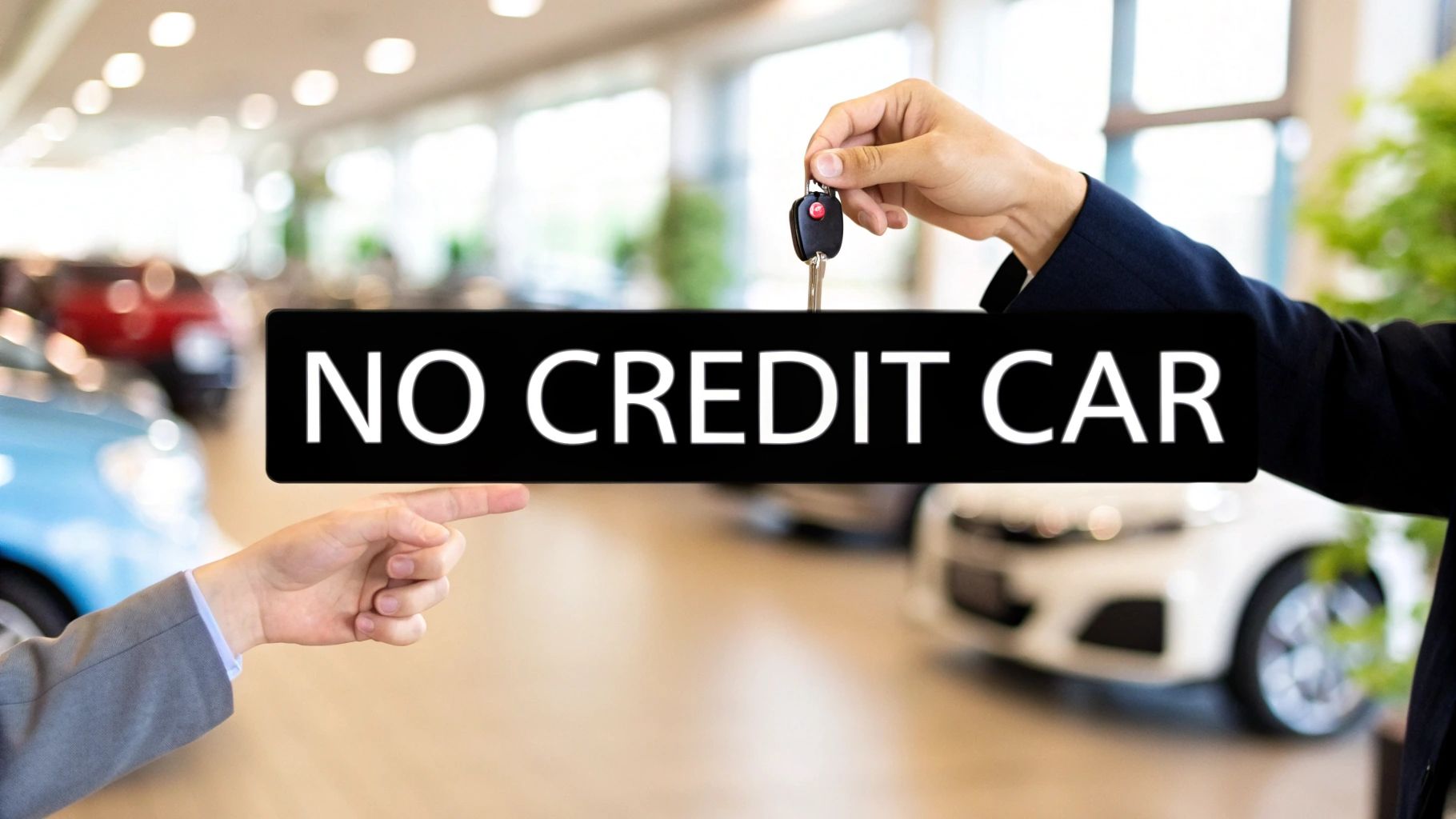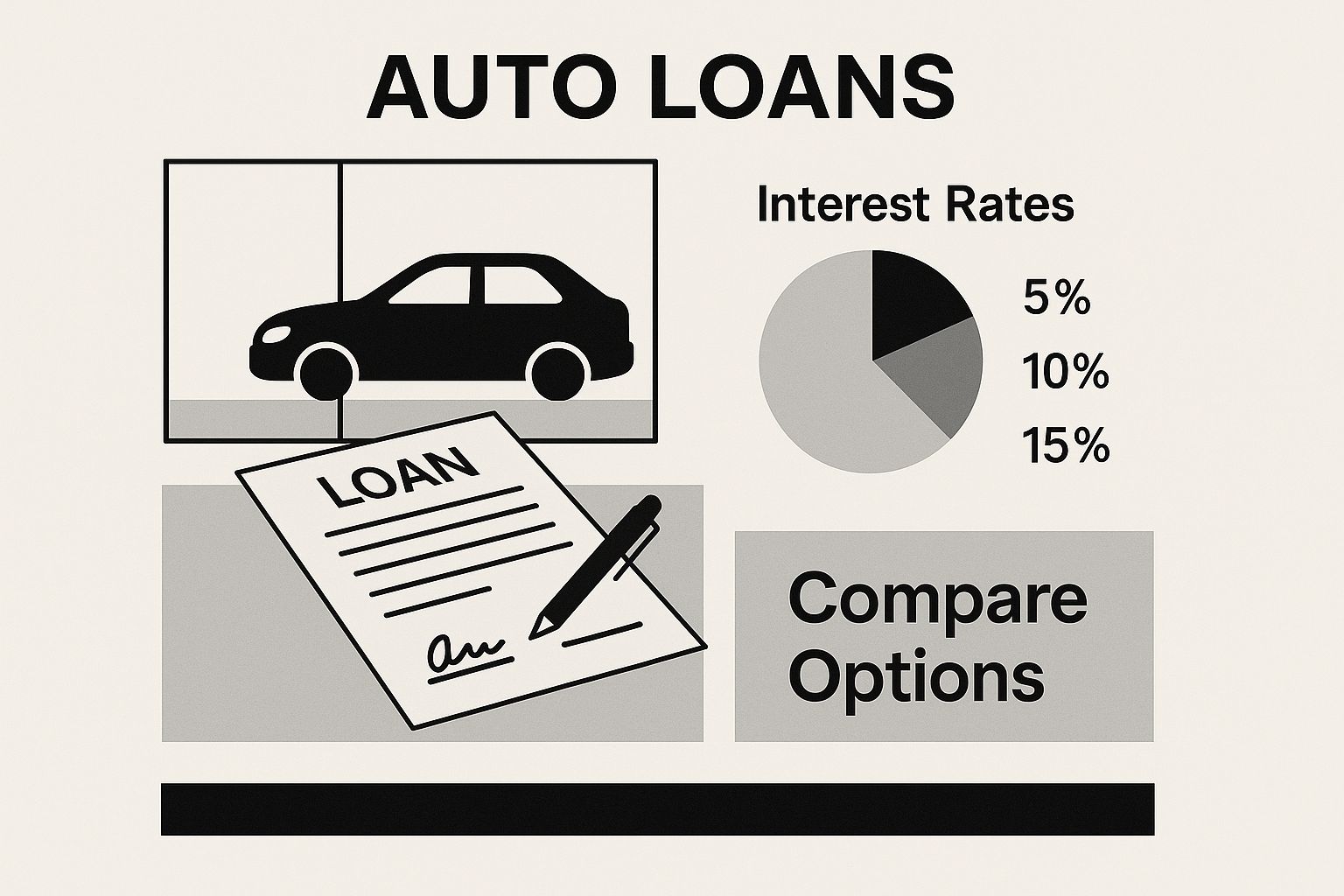Can I Buy a Car with No Credit? Tips & Advice

So, you have no credit history and you need a car. Is it even possible? The short answer is yes, absolutely. You're not the first person in this boat—students, young adults, and anyone just starting their financial journey face this all the time. Your path to getting keys in your hand will just look a little different than it does for someone with a decade of credit history.
What It's Really Like Buying a Car with No Credit

When you ask, "can I buy a car with no credit," you'll find the main hurdle isn't getting a flat-out "no." The real issue is that, to a lender, you're a complete unknown. They rely on credit scores to guess how likely you are to pay back a loan. Without that history, they have no idea what to expect, which automatically flags you as a higher risk.
Because of this "credit invisibility," the whole process shifts. Lenders stop looking at your financial past and start focusing intensely on your financial present. They need solid proof that you're stable and can handle the monthly payments you’re about to take on.
What Lenders Look for When There's No Credit Score
Without a FICO score to lean on, lenders dig into other areas of your life to figure out if you're a good bet. Having your ducks in a row here is the first, and most important, step to getting a "yes."
Here’s what they’ll be looking at closely:
The auto market in 2025 makes this a bit more challenging, but it's still very doable, often with the help of subprime lenders who specialize in these situations. With the average new car payment hitting $749 per month, those without credit can expect higher interest rates and stricter loan terms. You can find more auto loan statistics on LendingTree.com. Lenders are playing it safe, so they'll likely require that bigger down payment or ask for a co-signer to reduce their risk.
Walking this path requires more prep work, but it’s far from a dead end. Once you understand exactly what lenders need to see, you can build a strong application that makes the absence of a credit score a non-issue.
To help you get organized, here’s a quick breakdown of the main factors you’ll be dealing with and how to get ready for them.
Key Factors for No-Credit Car Buyers at a Glance
Thinking through each of these points will put you in a much stronger position when you walk into a dealership or apply for a loan. It's all about proving your reliability in ways that don't involve a credit score.
Making Yourself a Stronger Candidate for Lenders

Before you even think about test-driving cars, the real work starts. When you don't have a credit score, lenders can't look at your financial past. Instead, they scrutinize your financial present. Your job is to make them feel confident that you're a safe bet.
You need to build a financial profile that shows you’re stable and reliable. Think of it as creating a portfolio that proves you can handle the loan, making it an easy "yes" for them. Honestly, this prep work is the single best thing you can do to boost your chances of getting approved.
Put Your Money Where Your Mouth Is: The Down Payment
Want to get a lender’s attention? Show up with a big down payment. It’s the clearest signal you can send that you're serious and financially responsible. When you put a good chunk of your own money down, you immediately lower the amount they have to risk, which is their number one concern.
Sure, any amount is better than nothing, but the sweet spot you should aim for is 10-20% of the car's price. So, for a 15,000** car, you’d want to save between **1,500 and $3,000. This isn't just a number to hit; it’s a strategic move. A healthy down payment can directly impact your interest rate and loan terms, and it might just be the one thing that pushes your application from "denied" to "approved."
Putting more money down also keeps you from going "upside down" on the loan, which is when you owe more than the car is actually worth. That’s a real risk with no-credit loans, which often come with higher interest rates.
Assemble Your "Proof of Stability" Binder
Next up, you need to gather the paperwork that tells your financial story. This is your evidence, your proof that you’re stable. Don't wait until you're sitting in a dealership finance office to scramble for these documents. Get them organized and ready to go.
Here's what your "proof of stability" package should include:
Walking in with this collection of documents completely changes the conversation. You’re no longer just an application with a blank credit file; you're a person with a steady job, a home, and a documented ability to manage your money. This is the concrete evidence a lender needs to feel good about giving you a loan.
Finding the Right No Credit Car Loan
Let's be honest: when you have no credit history, walking into a big national bank for a car loan is usually a dead end. They're built to make decisions based on algorithms and FICO scores. If you don't have one, their system often just says "no."
But that doesn't mean you're out of options. You just have to know where to look. Your best bet is to focus on lenders who are used to looking at the whole person, not just a three-digit number.
Exploring Your Financing Avenues
A great place to start your search is right in your own community. Your local credit union, for instance, operates very differently from a for-profit bank. Since they're member-owned, they often have more flexible lending rules and a genuine interest in helping people in their community. They’re more likely to sit down with you and consider your "proof of stability" documents, making a human-based decision.
Beyond credit unions, you’ll find a whole world of lenders who specialize in your exact situation. These are often called subprime auto lenders. They work directly with car dealerships to finance buyers with no credit or a rocky credit past. Yes, their interest rates are higher—that's how they balance the risk—but they provide a clear path to getting the keys in your hand.
Your main choices will boil down to a few key players:
The infographic below gives a quick overview to help you see how these options stack up.

As you can see, each path has its own set of trade-offs. The right one for you really depends on your financial situation and how much risk you're comfortable with.
To help you sort through these options, I've put together a table that breaks down what you can realistically expect from each type of lender.
Comparing Financing Options for No-Credit Buyers
This table shows a clear trade-off: easier approval often comes with a much higher long-term cost. It's crucial to weigh that cost before you sign anything.
Understanding Buy Here Pay Here Dealerships
"Buy Here, Pay Here" lots can feel like a lifesaver when you've been turned down everywhere else. They advertise quick and easy approval, and they deliver on that promise. But you have to go in with your eyes wide open.
This convenience comes at a steep price. Their business model relies on high interest rates, sometimes climbing over 20%. They may also demand strict payment schedules, like requiring you to come in and pay in cash every two weeks. Miss a single payment, and some contracts allow for immediate repossession of the car.
As big banks have tightened their lending standards, a larger market has opened up for these alternative financing options. This means more choices for you, but also more reason to be careful. For those who use an ITIN instead of an SSN, there are specific strategies to consider; you can learn more about how to get an auto loan with an ITIN number in our detailed guide at https://www.itinscore.com/blog/auto-loan-with-itin-number/.
Once you’ve done your research and picked a few promising dealerships, the next step is to apply for financing. Many dealers now let you complete a credit application online to get the ball rolling. This is where all your preparation—gathering pay stubs, proof of residence, and other documents—really pays off. Showing up organized makes you look like a reliable, low-risk applicant, which is your best tool for getting the most favorable terms possible.
Bringing in a Co-Signer to Get Approved
When you're working with a blank financial slate, a co-signer can be your single most powerful tool. A co-signer is someone with a solid credit history who agrees to put their name on the loan with you, sharing the legal responsibility.
To a lender, this is like a safety net. Their good credit essentially vouches for you. If something happens and you can't make a payment, the co-signer is legally on the hook to pay. This dramatically lowers the lender's risk, making them far more likely to say "yes" to your application—and often with better terms than you'd ever get alone.
Who Should You Ask to Co-Sign?
Choosing a co-signer is a big deal. It’s a decision that blends money and relationships, so you can't just ask anyone with a high credit score. You need someone you trust completely, and who has that same level of trust in you.
The best people to ask are usually close to you and financially stable. Think:
What you're looking for is someone with a strong credit profile. That means a FICO score well above 700, a long track record of paying bills on time, and not too much existing debt. When they co-sign, their financial strength temporarily becomes your own in the lender's eyes.
How to Have "The Talk"
Asking someone to co-sign is not a casual request. It’s a serious conversation, and you need to approach it with honesty and preparation. You're asking them to take a significant financial risk for you.
Before you even bring it up, get your ducks in a row. Pull together your budget, proof of income, and a clear plan showing how you'll make every payment on time.
Walk them through it. Show them you've thought this through and aren't taking it lightly. This conversation is all about proving you’re reliable and that you respect the commitment they’re making. A co-signer can be your bridge to getting a great car loan, but that bridge has to be built on a solid foundation of trust.
How Your First Car Loan Can Build Your Credit
Getting the keys to your first car feels incredible, but that loan you just signed is more than a ticket to freedom—it's your single best chance to build a strong credit history from scratch. Think of this auto loan as your entry into the world of credit. If you handle it right, it will open doors for you financially for years to come.
This loan isn't just another monthly bill. It’s a strategic tool. Every on-time payment you make is a signal to the financial world that you're reliable, adding a positive mark to your brand-new credit file.
Confirm Your Lender Reports to All Three Bureaus
Before you sign on the dotted line, there's one question you absolutely have to ask: "Do you report my payment history to all three major credit bureaus?" You need to hear them say yes for Experian, Equifax, and TransUnion.
If a lender only reports to one or two—or worse, none at all—your hard work of paying on time won't do you much good. You're trying to build a comprehensive credit profile that all future lenders can see. A loan that isn't reported everywhere is a massive missed opportunity. Don't be afraid to walk away if they don't.
Turn On-Time Payments into a Powerful Habit
Once the loan is active, your mission is simple: never, ever be late with a payment. This is the golden rule of credit building. Your payment history is the biggest piece of the credit score puzzle, making up a whopping 35% of your score.
The easiest way to nail this is to set up automatic payments directly from your checking account. Just set it and forget it. Every single on-time payment proves you're a dependable borrower, and these are the positive marks that will grow into a solid credit score. For a deeper look into how these types of loans work, check out our guide on using installment loans for building credit.
This is especially critical in today's lending environment. Having no credit history can seriously inflate the cost of a loan. According to Experian data, while the average interest rate for a new car loan was around 6.73%, people with no credit often get pushed into the subprime category with much higher rates.
As you build this positive history, the benefits will start to stack up, and not just for future loans. A good credit score can save you money in unexpected places. For example, it’s worth learning how your credit score can affect car insurance premiums. Getting this first car loan right is your first big step toward a healthier financial future.
Common Questions About Buying a Car with No Credit
Diving into the car market without a credit history can feel like walking into the unknown. You're bound to have a ton of questions and "what if" scenarios running through your mind. Let's clear the air and tackle some of the most common concerns I hear from first-time buyers.
Will Applying for Multiple Loans Wreck My Future Credit Score?
This is a huge, and totally valid, worry. The good news is, the credit system is smarter than you think and is built to handle rate shopping.
When you apply for several auto loans within a short time frame—usually 14 to 45 days—the credit bureaus see what you're doing. They bundle all those applications together and count them as a single inquiry.
Sure, a hard inquiry will eventually pop up on your new credit report, but the ding is small and temporary. The long-term benefit of building a solid payment history on a new loan will completely overshadow that tiny initial dip. The best game plan? Get all your loan applications in within a two-week window to keep the impact minimal. If you want to get into the weeds, you can learn more about what is a hard credit pull and how it affects your score.
What Kind of Cars Are Easiest to Get a Loan For?
Lenders are all about managing risk. A reliable, less expensive used car is a much safer bet for them than a flashy new vehicle that loses value the second you drive it off the lot. Because of this, you’ll find your approval odds go way up if you focus on practical, affordable used cars.
I'm not talking about a specific brand, but rather the car's overall price tag, age, and mileage. A lender is far more likely to say yes to a 15,000** loan for a certified pre-owned sedan than a **30,000 loan for a new SUV, especially for a borrower with no credit history.
Can I Really Get a Car Loan with No Credit and No Money Down?
Ah, the "zero down" dream. While it's not technically impossible, it's incredibly rare and almost always a bad deal for you. Think of a down payment as your way of showing the lender you're serious and have some skin in the game. It instantly lowers their risk, which makes them more willing to work with you.
What’s the Difference Between Pre-Qualification and Pre-Approval?
These two terms get thrown around a lot, and they sound similar, but they are miles apart. Knowing the difference is a game-changer.